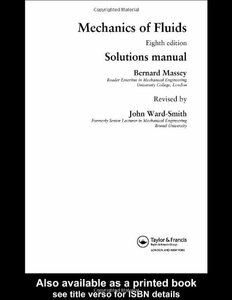
Mechanics of Fluids. Solutions Manual PDF
Preview Mechanics of Fluids. Solutions Manual
Mechanics of Fluids Solutions Manual Mechanics of Fluids Eighth edition Solutions manual Bernard Massey ReaderEmeritusinMechanicalEngineering UniversityCollege,London Revised by John Ward-Smith FormerlySeniorLecturerinMechanicalEngineering BrunelUniversity SeventheditionpublishedbyStanleyThornes(Publishers)Ltdin1998 Eightheditionpublished2006 byTaylor&Francis 2ParkSquare,MiltonPark,Abingdon,OxonOX144RN SimultaneouslypublishedintheUSAandCanada byTaylor&Francis 270MadisonAve,NewYork,NY10016 Taylor&FrancisisanimprintoftheTaylor&FrancisGroup This edition published in the Taylor & Francis e-Library, 2005. “To purchase your own copy of this or any of Taylor & Francis or Routledge’s collection of thousands of eBooks please go to www.eBookstore.tandf.co.uk.” ©2006BernardMasseyandJohnWard-Smith TherightofB.S.MasseyandJ.Ward-Smithtobeidentifiedasauthorsof thisworkhasbeenassertedbytheminaccordancewiththeCopyright DesignsandPatentsAct1988. Allrightsreserved.Nopartofthisbookmaybereprintedor reproducedorutilisedinanyformorbyanyelectronic,mechanical,or othermeans,nowknownorhereafterinvented,includingphotocopying andrecording,orinanyinformationstorageorretrievalsystem, withoutpermissioninwritingfromthepublishers. Thepublishermakesnorepresentation,expressorimplied,withregard totheaccuracyoftheinformationcontainedinthisbookandcannot acceptanylegalresponsibilityorliabilityforanyeffortsor omissionsthatmaybemade. BritishLibraryCataloguinginPublicationData AcataloguerecordforthisbookisavailablefromtheBritishLibrary LibraryofCongressCataloginginPublicationData Acatalogrecordforthisbookhasbeenrequested ISBN 0-203-01231-3 Master e-book ISBN ISBN0–415–36204–0(Print Edition) Chapter 1 1.1 V T p SincepV =mRT, 1 = 1 2 V T p 1 2 1 π 288.15 1.1 ∴V = (20m)3 =56.2m3 1 6 233.15101.3 1.2 (cid:4)= p = 1.4×105 N·m−2 =1.51kg·m−3 RT 287J·kg−1·K−1×323.15K ∂p p−p 1.3 K =(cid:4) AssumeK constant.Thenln((cid:4)/(cid:4) )= 0 ∂(cid:4) (cid:1) (cid:2) 0 (cid:3) K (cid:4) ∴(cid:4)=(cid:4) exp p−p0 =1025kg·m−3exp 81.7×106 0 K 2.34×109 =1061kg·m−3 1.4 (cid:4)= µ = 2×10−5 N·s·m−2 =1.333kg·m−3 ν 15×10−6 m2·s−1 R= p = 1.013×105 N·m−2 =259.2J·kg−1·K−1 (cid:4)T 1.333kg·m−3×293.15K 8310 ∴M= =32.06 259.2 1.5 µ=ν(cid:4)=400×10−6 m2·s−1×850kg·m−3 =0.34Pa·s Velocitygradient= 0.12m·s−1 =1200s−1 0.1×10−3 m Area=π0.2×1.2m2 =0.754m2 Force=0.754m2×0.34Pa·s×1200s−1 =307.6N 2 Solutionsmanual (cid:5)(cid:1) (cid:2) (cid:1) (cid:2) (cid:6) ∂u ∂u 1.6 Totalforceonplate=Area×µ + ∂y ∂y sideA sideB (cid:7) (cid:8) 0.15m·s−1 0.15m·s−1 =(0.25m)2×0.7Pa·s + 0.006m 0.019m =1.439N 1.7 Forannulus,radiusr,widthδr Velocity ωr Force=Area×µ× =2πrδrµ Clearance c µω ∴Torque=Force×r=2πr3δr c (cid:9) R µω πR4µω Totaltorque= 2πr3 dr= c 2c 0 π(0.1m)40.14Pa·s×2π ×7rad·s−1 = =7.44N·m 2×0.00013m 1.8 2γ 2×0.073N·m−1 p= = =36.5Pa d 0.004m 1.9 4γ cosθ 4×0.073N·m−1×1 h= = (cid:4)gd 1000kg·m−3×9.81N·kg−1×0.005m =0.00595m=5.95mm 1.10 4×0.377N·m−1×cos140◦ h= (13.56−1)1000kg·m−3×9.81N·kg−1×0.006m =−1.563mm 1.11 ud(cid:4) 4Q(cid:4) 4×0.0025m3·s−1×900kg·m−3 Re= = = =1508 µ πdµ π0.05m×0.038N·s·m−2 u= 2000µ = 2000×0.038N·s·m−2 =1.689m·s−1 d(cid:4) 0.05m×900kg·m−3 1.12 4Q(cid:4) 4×0.01m3·s−1 Re= = =430 ∴Laminar πdµ π0.08m×370×10−6 m2·s−1 Chapter 2 p 200×103 N·m−2 2.1 h= = =12.82m (cid:4)g 1590kg·m−3×9.81N·kg−1 2.2 Pressuredependsonlyondepthbelowfreesurface. (a) p=(cid:4)gh=(820kg·m−3×9.81N·kg−1)(3−0.15)m =22930N·m−2 =22.93kPa (b) p=820×9.81N·m−3×(3+2)m=40.2kPa (c) p=820×9.81N·m−3×{3+2−(1.2sin30◦+0.6)}m =820×9.81×3.8N·m−2 =30.57kPa (d) Load=Pressure×Area =820×9.81×3N·m−2×(3.5×2.5)m2 =211.2kN p (cid:4) gh (cid:4) 2.3 h = = water water = waterh air (cid:4) g (cid:4) g (cid:4) water air air air 1000kg·m−3×287J·kg−1·K−1×288.15K = 0.075m 1.013×105 N·m−2 =61.2m 2.4 pV =constant (cid:1) (cid:2) d 3 101.3×103 Pa+1000kg·m−3×9.81N·kg−1×9m ∴ = 4mm 101.3×103 Pa whenced =4.93mm 2.5 (cid:13)p=820kg·m−3×9.81N·kg−1×2m+(13.56−0.82) ×1000kg·m−3×9.81N·kg−1×0.225m=44.2kPa 4 Solutionsmanual (cid:13)p∗ 0.225m(13.56−0.82)1000kg·m−3×9.81N·kg−1 =(cid:13)h= (cid:4)g 820kg·m−3×9.81N·kg−1 =3.496m 44200N·m−2=820×9.81×2N·m−2+x(0.82−0.74)1000 ×9.81N·m−3 whencex=35.83m 2.6 New levels Movementoffluidin A x y B C =60mm×70mm2 =(500mm2)x X X =(800mm2)y Initial C ∴x=8.4mm; surface of separation y=5.25mm MeasuringaboveXX:Initially0.8h =0.9h A B Later:800×9.81(Oldh −60+8.4)10−3 Pa A =p+900×9.81(Oldh −60+5.25)10−3 Pa B ∴ p=9.81×10−3(−800×51.6+900×65.25)Pa=171.1Pa (cid:1) (cid:2) λz g/Rλ 2.7 Fromeqn2.7 p=p 1− 0 T (cid:1)0 (cid:2) 0.0065×7500 9.81/287×0.0065 =101.5Pa 1− 288.15 =38.3kPa (cid:1) (cid:2) (cid:1) (cid:2) 2.8 p = T0−λz g/Rλ = Ttop g/Rλ p T T +λz 0 0 top (cid:7)(cid:1) (cid:2) (cid:8) ∴z= Ttop p0 Rλ/g−1 λ p (cid:7)(cid:1) (cid:2) (cid:8) 268.15 749 287×0.0065/9.81 = m −1 0.0065 566 =2257m Chapter2 5 2.9 F =(1.2×1.8)m2×1000kg·m−3×9.81N·kg−1 ×(x+0.9sin30◦)m (a) 2160×9.81N·m−1×0.45m=9.54kN (b) 2160×9.81N·m−1×0.95m=20.13kN (c) 2160×9.81N·m−1×30.45m=645kN (bd3/12)+bd(2x+0.9)2 Centreofpressureisatslantdepth bd(2x+0.9) d2 = +2x+0.9(metres) 12(2x+0.9) (1.8m)2 = +2x+0.9m 12(2x+0.9) (cid:7) (cid:8) 1.82 thatis +0.9 mfromupperedge 12(2x+0.9) =(a)1.2m; (b)1.042m; (c)0.904mfromupperedge 2.10 Bysymmetry,centre X X ofpressureison x θ r verticalcentre-line 2ndmomentaboutXX Depth= 1stmomentaboutXX (cid:10) rx22(r2−x2)1/2dx = (cid:10)0 rx2(r2−x2)1/2dx 0 (cid:10) 0 (rcosθ)22rsinθ(−rsinθdθ) = π(cid:10)/2 0 rcosθ2rsinθ(−rsinθdθ) π/2 (cid:10) r π/2cos2θsin2θdθ = (cid:10)0 π/2sin2θcosθdθ 0 (cid:10) r π 1sin22θd(2θ) = 0(cid:11)8 (cid:12) π/2 1sin3θ 3 0 r/8[2θ/2−(1/4)sin4θ]2θ=π = 0 1/3 3 π 3πd = r = 8 2 32
